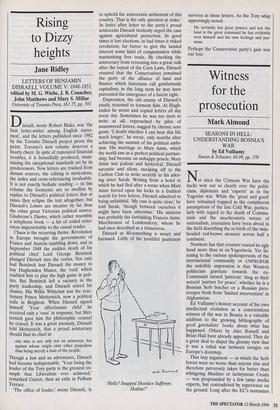Rising to Dizzy heights
Jane Ridley
LETTERS OF BENJAMIN DISRAELI, VOLUME V: 1848-1851 edited by M. G. Wiebe, J. B. Conacher, John Matthews and Mary S. Millar University of Toronto Press, f61.75, pp. 591
Disraeli, wrote Robert Blake, was 'the best letter-writer among English states- men', and the letters published since 1982 by the Toronto Disraeli project prove the point. Toronto's new volume deserves a hearty cheer. In spite of rumoured financial troubles, it is beautifully produced, main- taining the exceptional standards set by its predecessors. New letters are tracked from distant sources, the editing is meticulous, the index and cross-referencing invaluable. It is not exactly bedside reading — in this volume the footnotes are so swollen by replies to Disraeli's political letters that at times they eclipse the text altogether; but Disraeli's Letters are meatier by far than the other great Victorian political source, Gladstone's Diaries, which rather resemble a telephone book — a list of coded refer- ences impenetrable to the casual reader. Chaos is the recurring theme. Revolution in Europe brought the governments of France and Austria tumbling down, and in September 1848 the sudden death of his political chief Lord George Bentinck plunged Disraeli into the vortex. Not only had Bentinck lent Disraeli the money to buy Hughenden Manor, the 'rock' which enabled him to play the high game in poli- tics. But Bentinck left a vacancy in the party leadership, and Disraeli seized his chance. His Willie Whitelaw was the reac- tionary Prince Metternich, now a political exile in Brighton. When Disraeli signed himself 'Your affectionate child' he received only a `vous' in response, but Met- ternich gave him the philosophic counsel he craved. It was a great anomaly, Disraeli told Metternich, that a proud aristocracy should find its chief in
one who is not only not an aristocrat, but against whose origin exist other prejudices than being merely a man of the people.
Though a Jew and an adventurer, Disraeli had become indispensable. 'Your being the leader of the Tory party is the greatest tri- umph that Liberalism ever achieved,' remarked Guizot, then an exile in Pelham Terrace.
`The office of leader,' wrote Disraeli, 'is to uphold the aristocratic settlement of this country. That is the only question at stake.' In letter after letter to the party's proud aristocrats Disraeli tirelessly urged the case against agricultural protection. In good times it lost elections, in bad times it risked revolution; far better to give the landed interest some kind of compensation while maintaining free trade. By checking the aristocracy from retreating into a great sulk after the repeal of the Corn Laws, Disraeli ensured that the Conservatives remained the party of the alliance of land and finance which historians call gentlemanly capitalism; in the long term he may have prevented the emergence of a fascist right.
Depression, the old enemy of Disraeli's youth, returned to torment him. At Hugh- enden he wrote and copied letters all day every day. Sometimes he was too inert to write at all, reproached by piles of unanswered letters, nagged by chronic sore gums. 'I doubt whether I can bear this life much longer,' he wrote, only months after achieving the summit of his political ambi- tion. His marriage to Mary Anne, which the world saw as a perfect political partner- ship, had become an unhappy prison. Mary Anne was jealous and hysterical, Disraeli sarcastic and silent, sneaking off to the Carlton Club to write secretly to his ador- ing sister Sarah. Writing from a hotel to which he had fled after a scene when Mary Anne forced open his locks in a fruitless search for love letters, Disraeli admitted to being unfaithful. 'My case is quite clear,' he told Sarah, 'though between ourselves it might have been otherwise.' His mistress was probably the forbidding Frances Anne, Marchioness of Londonderry, whom he had once described as a rhinoceros.
Disraeli at 40-something is weary and harassed. Little of his youthful jauntiness `Hello? Snapped Shoelace Sufferers Hotline?' survives in these letters. As the Tory whip approvingly noted:
He certainly has great powers and not the least is the great command he has evidently over himself and his own feelings and pas- sions.
Perhaps the Conservative party's gain was our loss.


















































 Previous page
Previous page